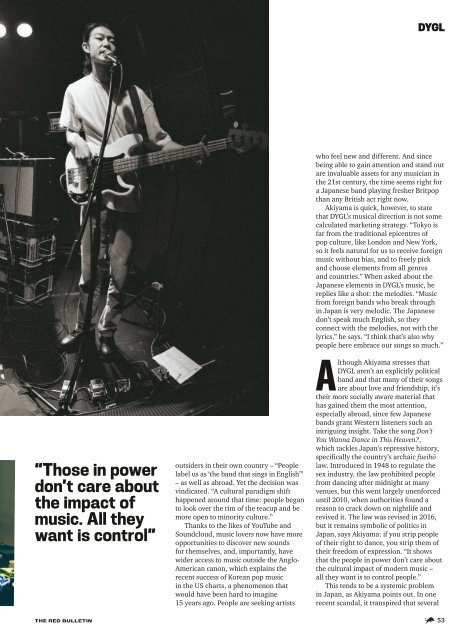You also want an ePaper? Increase the reach of your titles
YUMPU automatically turns print PDFs into web optimized ePapers that Google loves.
DYGL<br />
“Those in power<br />
don’t care about<br />
the impact of<br />
music. All they<br />
want is control”<br />
outsiders in their own country – “People<br />
label us as ‘the band that sings in English’”<br />
– as well as abroad. Yet the decision was<br />
vindicated. “A cultural paradigm shift<br />
happened around that time: people began<br />
to look over the rim of the teacup and be<br />
more open to minority culture.”<br />
Thanks to the likes of YouTube and<br />
Soundcloud, music lovers now have more<br />
opportunities to discover new sounds<br />
for themselves, and, importantly, have<br />
wider access to music outside the Anglo-<br />
American canon, which explains the<br />
recent success of Korean pop music<br />
in the US charts, a phenomenon that<br />
would have been hard to imagine<br />
15 years ago. People are seeking artists<br />
who feel new and different. And since<br />
being able to gain attention and stand out<br />
are invaluable assets for any musician in<br />
the 21st century, the time seems right for<br />
a Japanese band playing fresher Britpop<br />
than any British act right now.<br />
Akiyama is quick, however, to state<br />
that DYGL’s musical direction is not some<br />
calculated marketing strategy. “Tokyo is<br />
far from the traditional epicentres of<br />
pop culture, like London and New York,<br />
so it feels natural for us to receive foreign<br />
music without bias, and to freely pick<br />
and choose elements from all genres<br />
and countries.” When asked about the<br />
Japanese elements in DYGL’s music, he<br />
replies like a shot: the melodies. “Music<br />
from foreign bands who break through<br />
in Japan is very melodic. <strong>The</strong> Japanese<br />
don’t speak much English, so they<br />
connect with the melodies, not with the<br />
lyrics,” he says. “I think that’s also why<br />
people here embrace our songs so much.”<br />
Although Akiyama stresses that<br />
DYGL aren’t an explicitly political<br />
band and that many of their songs<br />
are about love and friendship, it’s<br />
their more socially aware material that<br />
has gained them the most attention,<br />
especially abroad, since few Japanese<br />
bands grant Western listeners such an<br />
intriguing insight. Take the song Don’t<br />
You Wanna Dance in This Heaven?,<br />
which tackles Japan’s repressive history,<br />
specifically the country’s archaic fueihō<br />
law. Introduced in 1948 to regulate the<br />
sex industry, the law prohibited people<br />
from dancing after midnight at many<br />
venues, but this went largely unenforced<br />
until 2010, when authorities found a<br />
reason to crack down on nightlife and<br />
revived it. <strong>The</strong> law was revised in 2016,<br />
but it remains symbolic of politics in<br />
Japan, says Akiyama: if you strip people<br />
of their right to dance, you strip them of<br />
their freedom of expression. “It shows<br />
that the people in power don’t care about<br />
the cultural impact of modern music –<br />
all they want is to control people.”<br />
This tends to be a systemic problem<br />
in Japan, as Akiyama points out. In one<br />
recent scandal, it transpired that several<br />
THE RED BULLETIN 53

















